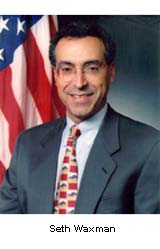|
Microsoft pursues appeal
|
 |
June 9, 2000: 4:58 p.m. ET
Company stays on appeals path, dismisses settlement speculation
|
NEW YORK (CNNfn) - Two days after a federal judge ordered a breakup of Microsoft Corp., the software company continued down a path that will lead to an appeal of the landmark antitrust case and dismissed speculation that it might negotiate a settlement.
Reuters quoted Microsoft Chief Executive Steve Ballmer saying that the company welcomed a suggestion from the Justice Department that talks could be held in an effort to settle the antitrust dispute.
 "We would still love that opportunity," Ballmer told a news conference during a European Business Summit, according to Reuters. "We would still love that opportunity," Ballmer told a news conference during a European Business Summit, according to Reuters.
Earlier talks aimed at reaching a settlement collapsed in early April, after which Judge Thomas Penfield Jackson found Microsoft guilty of violating federal antitrust laws.
However, Microsoft spokesman Jim Cullinan on Friday downplayed the possibility of settlement talks.
"We will always be interested in a fair and reasonable settlement, but the government is just posturing with this," Cullinan said. "The government is saying that as long as we agree to whatever extreme proposals the court signed, they would be willing to settle the case."
Cullinan said that Microsoft doesn't plan to depart from its two principles of "freedom to innovate" and "protecting the integrity of our products." The company says that Judge Jackson's final ruling in the case violates both of those principles. "We will not allow our copyrighted product to be ripped apart by other companies," Cullinan said.
Microsoft said on Wednesday that it will file an appeal of Judge Jackson's breakup ruling with the D.C. Circuit Court of Appeals. The company already has filed a separate request with Judge Jackson to stay the portion of the judge's final ruling that would place restrictions on Microsoft's business conduct.
Even though Jackson is almost certain to deny Microsoft's request for a stay, the Justice Department on Thursday asked for more time to review the company's motion. Government attorneys asked Judge Jackson to give them until Monday to comment on Microsoft's requested stay, a move Microsoft regards as foot-dragging by the government.
Microsoft's Cullinan said that the company will file a separate motion to delay the conduct remedies ordered by Judge Jackson with the U.S. Court of Appeals, although he didn't state when that will occur. The motion for a stay is separate from the actual appeal that the company plans to file, possibly later this month.
The Justice Department wants to have the Microsoft case appealed directly to the Supreme Court, rather than to the Court of Appeals, since that would speed the process. Microsoft, by contrast, wants to try its hand with the Court of Appeals first, because that court has been favorable to Microsoft in a separate case involving the government.
"We think we are going to win whichever place we go, but with the huge record this case contains and the huge number of procedural, factual, and legal errors committed, we think the appeals court would be a more appropriate venue for the first phase," Cullinan said.
To move the case directly to the Supreme Court, the U.S. Solicitor General has to ask Judge Jackson to sign a petition to bypass the appeals court. The Solicitor General's Office is a fairly obscure part of the Justice Department that supervises and conducts government litigation in the Supreme Court. The federal government is involved in about two-thirds of all the cases the Supreme Court decides on the merits each year.
 The current Solicitor General, Seth Waxman, was nominated by President Clinton in September 1997. The previously obscure Waxman is likely to have a moment in the spotlight later this month. The current Solicitor General, Seth Waxman, was nominated by President Clinton in September 1997. The previously obscure Waxman is likely to have a moment in the spotlight later this month.
However, the Supreme Court is likely to reject any effort by the Justice Department to bypass the appeals court, antitrust lawyers said. The high court prefers to review the slimmed down legal record that appeals courts create, rather than wading through long, complicated lower-court trial records.
To be sure, an immediate review by the Supreme Court is not entirely out of the question. An amendment made to federal antitrust laws in the mid-1970s makes it more feasible to bypass the court of appeals in cases of significant national importance.
Microsoft (MSFT: Research, Estimates) stock remained unchanged Friday at 68-13/16. 
|
|
|
|
|
 |

|

